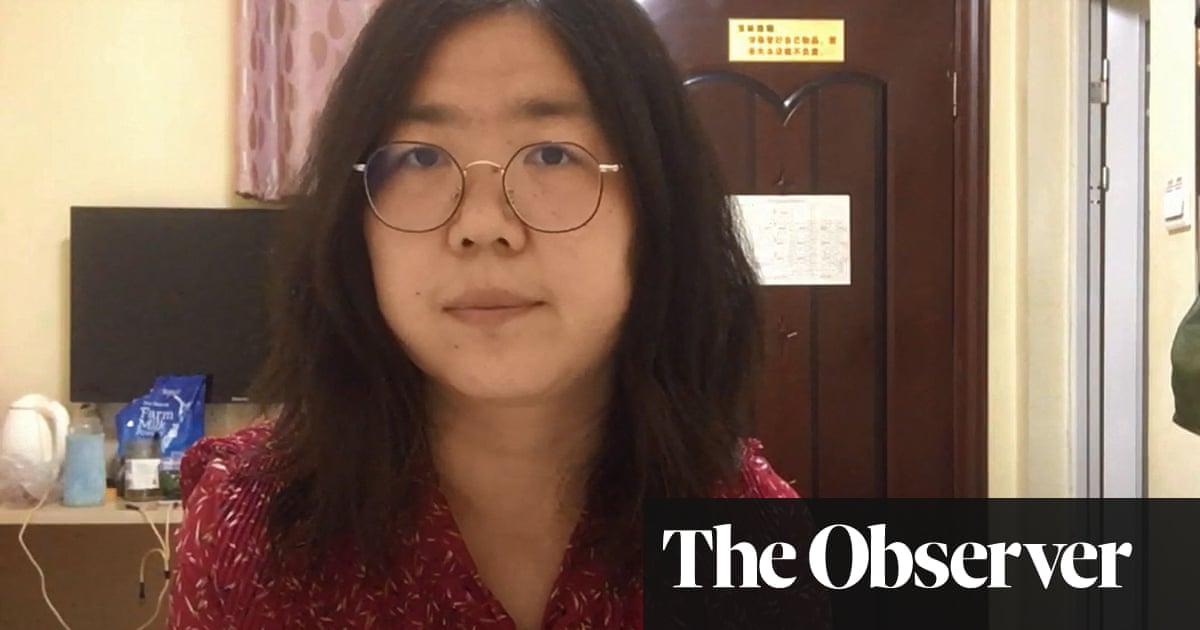Citizen journalist Zhang Zhan’s search for the truth during the early days of the pandemic was seen as a threat by the authorities
A Chinese citizen journalist who has been in prison for four years after reporting on the early days of the Covid-19 epidemic in Wuhan is due to be released on Monday.
Zhang Zhan, a former lawyer, travelled to Wuhan in February 2020 to document the Chinese government’s response to what became the start of a global pandemic. She shared her reports on X (then known as Twitter), YouTube and WeChat. She was one of the few independent Chinese reporters on the ground as Wuhan and the rest of China went into lockdown.
In one video, recorded in February 2020, Zhang said: “I can’t find anything to say except that the city is paralysed because everything is under cover. That’s what this country is facing now … They imprison us in the name of pandemic prevention and restrict our freedom. We must not talk to strangers, it’s dangerous. So without the truth, everything is meaningless. If we cannot get to the truth, if we cannot break the monopoly of the truth, the world means nothing to us.”
In another video, she showed a hospital that was overflowing with patients on trolleys in the hallway.



As a Chinese person, I want to say: She may be innocent, but she deserves it.
Let’s think of China as a computer with numerous programs running on it. The programs represent people and activities (normal work and life). The governing bodies are the operating system, while the Chinese Communist Party (CCP) is the programmer sitting in front of the computer. Sometimes, when programs want to change something beyond their scope of action (like street protests or large-scale online denunciations—complaining in a personal capacity is considered within normal scope), the operating system often first acts to prevent these overreaching actions (many times this doesn’t involve persecution, but rather a phone call or a visit to tell you to stop. In common terms within the country, this is called “cooling down the heat”). The primary goal of the operating system is to maintain the stable operation of the computer. The more stable and efficient it runs, the more likely it is to be promoted. When the programmer notices that a program is running unstably, the operating system will be modified to ensure greater stability and efficiency. This means the political careers of incompetent or unfit officials will end. This is why you sometimes see the government silencing people, but eventually, the situation still moves towards a relatively good outcome. For instance, in the “Tangshan BBQ beating incident,” initially the local government tried to cool down the heat, but when higher-level authorities and the CCP intervened, the local government’s protectors were removed, and the perpetrators were sentenced to 24 years. The pandemic situation was similar: at first, the Wuhan local government tried to cool down the heat, but when the whole country focused on Wuhan, several responsible officials there were held accountable by the central government and their political careers ended.
However, if the change in the program’s scope of action is due to the influence of external virus programs, even if the program’s actions seem right to you, the program must be terminated. Since the pandemic began in 2019, Zhang’s rhetoric has closely resembled that used by many foreign institutions, such as: calling for freedom, democracy, and denouncing CCP rule. The Chinese people do not care about this; we are more concerned with making money and improving our quality of life. It’s similar with the “Tank Man” incident: when foreign forces intervene, an internal conflict among the Chinese people becomes an external conflict between us and them. The economic conflicts of the 1990s, under the influence of Western powers, became an attempt to cause internal chaos in China through a “color revolution,” akin to a virus trying to turn the computer into a “zombie.” What do you think the programmer would do?
Foreign intervention in China is a very sensitive topic, reminding people of the history from 1840 to 1949, a period of human-on-human predation. Those who collaborated with Western countries lived very well, but ordinary people suffered immensely; small-scale farming economies were crushed by industrial machines, and proxy wars among foreign agents caused widespread chaos. Have you ever thought about why the CCP was able to unify the entire country? Why do the Chinese people support the CCP? Understand these questions before discussing China. I am tired of hearing you talk about snippets about China from Western media. It’s time to read history books, starting from 1840 to the present, paying attention to the global situation outside China. Then you will understand why China has become what it is today.